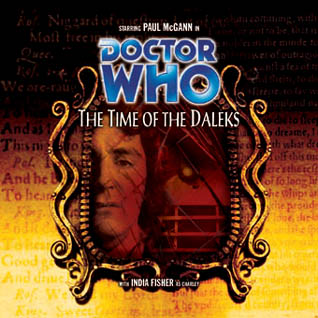
Released May 2002
After much anticipation, Paul McGann’s Eighth Doctor finally gets his first meeting with the Daleks in ‘Time of the Daleks,’ a tale that, unsurprisingly, deals very heavily with time. Just as importantly, though, events start to tie into the bigger underlying recurring theme and begin to set a clear path for future events.
The opening for this story is superb, chillingly setting the scene as the Daleks begin to put their plan into motion. This threat, interlaced with Shakespearean quotations, aptly foreshadows events that may just result in the end of time itself. It’s not until the Doctor alludes to Shakespeare to Charley, only to have the reference go straight over her head even though she is perfectly aware of other contemporary playwrights, that the Doctor himself becomes entwined in events. Realizing that something very wrong is occurring with time, he and Charley soon travel to twenty-first century London in search of a time fissure threatening to erase Shakespeare from history entirely. Rarely have opening scenes been so fast-paced and effective, and Justin Richards’s script wastes no time in getting to the story proper.
The plot of ‘The Time of the Daleks’ progresses at a quick speed after a rather lengthy discussion about the concept of using mirrors for time travel, and revelations occur at perfect intervals to keep any sense of lag from entering the script. Richards’s love of theatre and Shakespeare is apparent, continuing a theme from his superb novel Theatre of War, and the inclusion of this aspect to a Dalek story works exceedingly well, especially as the Daleks first appear quite benevolent while reciting Shakespeare. It’s this playing with anticipation and expectations that gives this audio a unique feel, allowing the continued revelations to have a more profound effect when presented.
Although the speed of events doesn’t allow for a full exploration of this unique London, Dot Smith’s General Mariah Learman proves to be a standout character. Her enthusiasm for Shakespeare is unquestionable, but the gravitas and power she speaks with also makes it believable that she could gain control as a dictator and do everything in her power to maintain control and achieve her goals. Sometimes the characterization is a little extreme and she seems a bit too overzealous and crazed, but overall it’s an effective performance. The Doctor and Charley’s assumed roles as her PR agents allow a convenient exploration of motives and the situation in general as they find that Charley is not the only one who has forgotten Shakespeare.
The remainder of the cast is quite strong as well. Nicola Boyce as Viola has the most crucial supporting role, convincingly conflicted by her sense of obligation to the General, her aunt, and desire to side with the rebels force against the General. Mark McDonnell excellently brings across his desire to restore both democracy and Shakespeare to the people as the rebel Priestly. The kitchen boy played by Jem Bassett is the other key player, becoming pivotal to events toward the end after being purposefully sidelined for much of the beginning of the tale.
As effective as the overall story is, however, it’s hard not to notice the similarities of many scenes with those of several preceding Dalek stories. While the progression of events is still extremely enjoyable as the Doctor discovers his foe, a Dalek menacingly reveals itself to the Doctor, and the Daleks try to alter history, it’s hard not to feel as if the Eighth Doctor is reliving his First and Second incarnations’ adventures. Regardless, the Daleks are written here as a nearly unstoppable force at their most cunning and ruthless, using Learman’s desire to create the time portal to their advantage. As they slowly put their plan into motion and begin to pass into Earth’s history, it leads to a chilling moment where they appear to have won, a rare moment of seeming utter triumph for the Daleks. As a fourth entry to the ‘Dalek Empire’ series of stories in this range, this is another successful audio outing for the Doctor’s greatest foes.
Richards also proves that he has a firm grasp on the main characters, and their performances are sublime. Paul McGann easily conveys the loathing his character holds for the Daleks even as his unbridled sense of adventure and enthusiasm drives him forward. Likewise, India Fisher gives one of her best performances as Charley yet, unafraid to try to stop the Daleks and to stand up for what is right. The revelation that she is a source of chronon energy and at the heart of the many time and paradox issues they have experienced recently is a great one, and major events are quickly set in motion for the upcoming releases. ‘The Time of the Daleks’ is not a perfect adventure, but its successes far outweigh its minor shortcoming as it provides a memorable first audio encounter between the Eighth Doctor and the Daleks. With a clever central storyline and the Daleks at their most ruthless, this is yet another strong entry in 2002’s Big Finish series. Though some of the characterization veers a bit too extreme, the tying in of previous events and the clear path set for events going forward- especially regarding the enigma that is Charley- give an overwhelming sense of interconnectedness and continuity to events that will hopefully have a satisfying resolution.
- Release Date: 5/2002


Leave a Reply